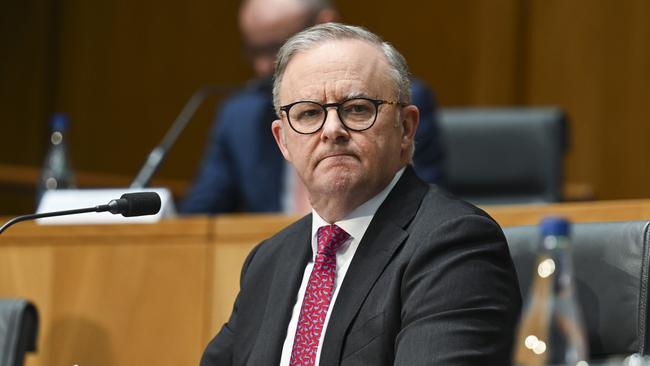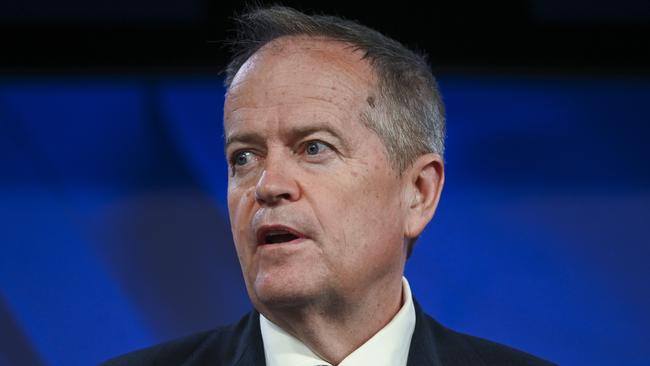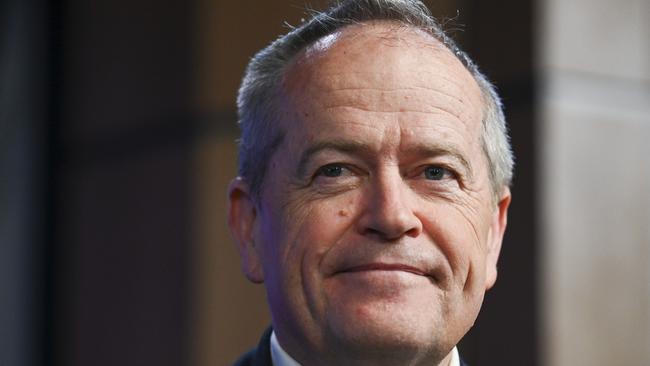Bill Shorten responds after major review recommends raft of changes to transform NDIS
Bill Shorten says considerable work needs to be put in to ensure the NDIS is future-proof, and the government is committed.
Bill Shorten said it was “always inevitable” there would be a “Mark II” moment in the NDIS.
Speaking at the National Press Club after a landmark review into Australia’s National Disability Insurance Scheme was released on Thursday – a decade after it was first established – the Government Services Minister committed the Albanese government to transforming the scheme for the future.
The review called for a five-year legislative overhaul to transform an “out of balance” system that rewards competitive behaviour among providers and gives people with disability little to no control over which services they access.
The long-awaited probe said significant changes were needed to secure the financial sustainability of the NDIS and ensure that eligible participants could access targeted support.
The report proposed 26 recommendations and 139 actions to “restore trust and pride” in a scheme that has heard mounting concerns over overpriced services, fraudulent providers and increasing financial unsustainability.

“We must return to the principle that NDIS eligibility is based first and foremost on functional impairment rather than medical diagnosis,” said review co-chairs Bruce Bonyhady and Lisa Paul.
“We must ensure the NDIS experience is centred around the whole person and their disability-related support needs.”
Mr Shorten, who’s first job in politics was as a junior minister for disability in 2007, was instrumental in setting up the NDIS in the Rudd-Gillaird years.
Asked whether there was anything he wished he could have recommended back in 2013, Mr Shorten said there were things that could have been done differently.
“I think it was always inevitable we have a Mark II moment,” he said.
“Would we do things differently? I think we’d do what we are doing now, then. But maybe it always had to be this iterative process.”
“If I had one thing, how would we belt and brace to make sure the agency was given more respect and have more resources.”

The review called for the government to immediately focus on attracting, retaining and training disability workers to meet future workforce demands and invest in greater support outside of the NDIS.
A raft of legislative changes will be needed to underpin the scheme’s reforms, the report said, including legislation to improve eligibility and access, as well as an early intervention pathway for children.
“With children making up half of all NDIS participants, it is clear that mainstream supports aren’t meeting the needs of children and families, who are turning to the NDIS as the only source of support,” it read.
The report proposed that the NDIS be reworked into a three-tiered system, with the first level offering targeted individual support for those most in need through the NDIS, and the second tier providing “foundational supports” outside the scheme to for those with disabilities that require less intensive support.
Mr Shorten sought to alleviate anxiety about the transition to foundational supports, saying the aim of the overhaul was to make accessing the NDIS a “more human experience”.
“We want to make sure that some of the people currently extracting some of the $36 billion last year and the $41 billion next year, that those people extracting it for themselves, that it gets back to use more productively for outcomes for participants,” he said.

One of the report’s key recommendations called on the national cabinet to agree to fund a coherent set of foundational disability supports outside individualised NDIS budgets, in response to rising concerns about the scheme’s long term financial needs.
Reaching the government’s desired budget reduction target to $87bn in 2032-33 would be “impossible” without significant investment from outside the scheme, the report said.
Despite supporting nearly 600,000 participants, annual spending on the NDIS reached $35bn in 2022-23. At the current growth rate of about 14 per cent each year, costs are projected to rise to $97bn by 2032-33.
On Wednesday, state and territory ministers agreed to cap their share of NDIS funding from 4 per cent to 8 per cent by 2026.
The Commonwealth will fund all cost blowouts from July 1 2026.
Mr Shorten lauded the states and territories for their co-operation.
“So yesterday was indeed a big deal, a genuine breakthrough for all people with disability,” he said.
“Together, the Commonwealth and the states and territories have ensured that the NDIS will not be the only lifeboat in the ocean, and I congratulate my state and territory brothers and sisters. We will do this together.”
He said it was not “the best plan in town” but warned that if the government did nothing, “it all eventually falls over”.
“Then it’s on all of us because we were too lazy to try,” he said.
“I’m not saying this is the best plan. We will make it a better plan as we go along together.”

The review also highlighted “significant problems” with how the NDIS interacts with mainstream health service systems, including the aged care sector, hospitals, jails and mental health systems.
It said recommended a new, dedicated approach for people living with a psychosocial disability and called to improve access to mental health services. It called for the introduction of “navigators” tasked to help people with disability find and access all services available to them across mainstream services, community supports, foundational supports and the NDIS.
The full government response to the review will be released in 2024.


